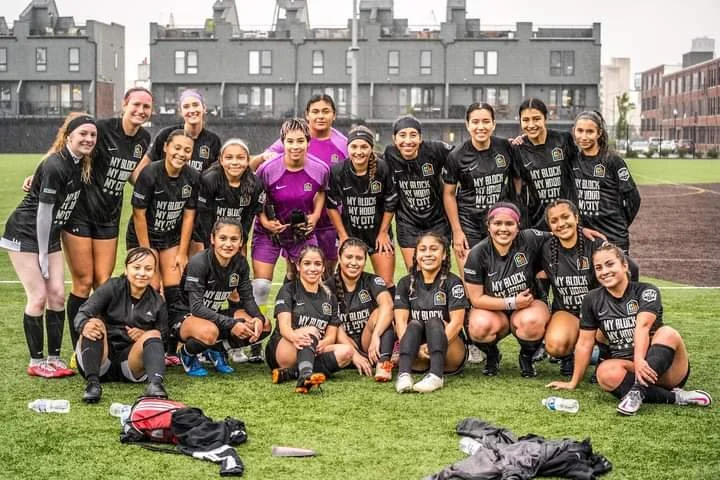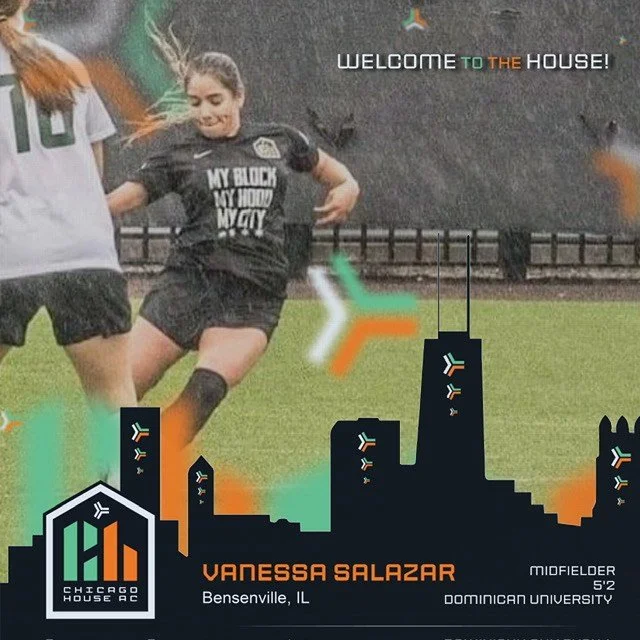Catching up with Chicago House AC - Women's team
It’s been a long road back for Chicago House Athletic Club.
Following the end of the 2021 season, it seemed like they were about to disappear into the void. Financial issues meant that they couldn’t play in NISA anymore, and the men’s team turned from a professional one into an amateur one.
The House stayed afloat somehow, and since then they’ve been forced to take the smallest of steps forward. They’ve kept moving forward, though. A U-23 men’s team was created, and then the first team had a dream run in the 2023 U.S. Open Cup.
Chicago’s in a much better place now, and they’re ready for their next step forward, which is a big one.
Welcome to the Chicago House women’s team.
Independent Beginnings
The House women’s team was originally created last April.
“A guy named Jason Almazan (father of former House player Damon Almazan) came to us with the idea,” said club managing partner, president, and CEO Peter Wilt. “He had a group of girls that he was training and he wanted an outlet for him, and he thought the House would be a fit for them. We agreed to fund it and let him use our brand last year.”
It was a fluid sort of set up. There wasn’t an official roster, and the team didn’t play in any particular league. They had an independent schedule, playing friendlies against local outfits like Edgewater Castle.
“We played against Edgewater, we played a couple of games up in Detroit, we had another couple of scrimmages to see how women's soccer with the House would look like for the first year. We got a pretty good turnout,” said head coach and technical director Henry Cheung.
Despite the lack of true structure, those involved were still able to learn a lot early on.
“One thing I learned is that women's soccer is huge. If you look at the Chicagoland area, there's a lot of women's soccer from professional to semi-pro to summer leagues. Girls are looking to play, they want to play all year long, but they never got the opportunity because women's soccer is still developing, even though the USWNT has won three women’s World Cups. It is very hard for the local player to come home from school and continue playing,” said Cheung.
“I learned that it’s very competitive, even when it’s just independent, even when it’s just a scrimmage. Girls want to play, girls want to show up even though they know that they may not get any playing time, but they still work hard and show up. We get emails from parents and from players asking if we’re going to have another team, when we’re going to have another tryout. They’re hungry for sure.”
Those players want to play for the House’s new team, and they’re bringing others with them too.
“Social media helps, but it's been predominantly word of mouth,” said chief operating officer Brian Koenig. “I mean, once you get a player in, she's got two or three friends that either play within her college or they played club soccer together. So that's been the driving force for recruitment.”
Chicago originally scheduled two tryouts at the end of 2023. However, there was such a high turnout and excitement about the opportunity that the club decided to host a third tryout, which will come in March.
“My college coach sent out an email to try out for Chicago House, so I decided I would check it out. After going to the first tryout everyone was so welcoming, especially coach Henry,” said midfielder Maggie Schmidt, who was one of the club’s initial signings. “To be one of the first players for the House is so cool, and I can't wait to help the team in its first season.”
“The turnout was really, really good. We have players from D1 all the way to the Juco level,” said Cheung. “Some of the girls have played together on a club team together. We have two or three Chicago House Academy girls. I mean we had a player all the way from Oklahoma. There’s a player from the west coast that wants to come here in the summer and stay in Chicago and just play because they want to see what Chicago is like.”
That has allowed the House to build up their roster ahead of this year, where they’ll take the next step forward.
Working Schedule
This past November, Chicago announced that their women’s team would be playing in the Women’s Premier Soccer League, otherwise known as the WPSL.
“We looked at geography, how much travel there would be. We looked at costs, we looked at history, the other clubs, the professionalism, and it wasn't a straightforward decision, but the WPSL was the best fit and that was a decision we ended up making,” said Wilt.
The House will take part in the Lake Michigan Division of the Midwest Conference, where they’ll face the likes of the Milwaukee Torrent, Chicago KICS Football Club, Green Bay Glory, and the Quad Cities Rush.
It’ll be a bit of a trial by fire for the new side.
“The season is going to be short, it's only like two months, eight games, hopefully we'll go deep playing in July in the playoffs. This is our first year and we are in a very tough division with teams that have been playing together for a long time,” said Cheung. “They have players that are returning from two years ago. I think we’re ready for the challenge.”
While the WPSL is an amateur league, it prides itself on its path-to-pro pipeline. They have over 100 former players now in the NWSL, and they had 23 alumni taken in the league’s draft last month.
Chicago’s always had a big focus on developing players into professionals when it comes to their men’s team, and the same will be the true for the women’s team.
“Right now it's very promising. We're excited with our current roster as we continue to develop it,” said Koenig. “The roster is a lot different than it was in our first year as an independent team. We relied on a lot of high school players and it's now more collegiate players.”
The rise of the women’s game in the United States will only help out the movement.
“I also think that there's more professional opportunities coming on the horizon for women's players with the launch of the USL Super League, that's essentially doubling the number of professional women's soccer opportunities,” said Wilt. “Before it had just been the NWSL, which was relatively small. Now it’s experiencing expansion, which is terrific. So instead of having whatever it was a few years ago, seven or eight teams in the country with professional soccer, you're going to have close to 20, maybe 30 within a couple of years. And each of those teams has 20 to 30 roster spots.”
The WPSL is not just a developmental league, though. The House will be tested in these games, and if they’re not ready, the competition will chew them up and spit them out.
“The players understand this is pre-professional. This is not a club academy team, so not everybody's going to get playing time. I have 25 players, and I can only pick the best 11,” said Cheung. “I told them the three things that I tell everyone that I coach, which is work hard, make good decisions, and have fun. If you can do those three things, you can accomplish a lot on the field.”
There’s a final note when it comes to the WPSL. Chief operating officer Brian Koenig was at the league’s recent AGM meetings, and it was an experience that only made him increasingly excited for the season ahead.
It was amazing. As a first team club, it was initially a little daunting. There's 142 teams in the league, so you're thrown into the fire,” said Koenig. “However, I told Wilt yesterday, one of the big things is that I'm more confident. When you're talking to other teams, when you find out what they're doing, what the House is doing, what we are doing is head and shoulders above other teams.”
“I’m not saying that we're perfect, right? You could kind of talk and figure out what other clubs are doing. That is aside from the scheduling, aside from learning from everything what WPSL offers, it's just that connection with the other clubs. Ultimately you come home and say, we are on the right path. We are making the right decisions. And ultimately for Chicago House, we're on that right path for the future,” said Koenig.
Treading Onwards
This isn’t some sort of vanity project or a way to seem more progressive.
The House is putting a lot of their resources into the women’s team, and they’re treating it as an equal to their men’s side.
“It's really important. It's half of our club, whether it's the WPSL team or the academy side. Half of the participants in soccer are women or girls,” said Wilt. “We think the women's team can actually have better business performance than the men's team and find its niche out there.”
“We're excited that the women's program is such a vital component of our success going forward,” said Koenig. “Not to discredit what the men's team has done, but there's so much movement on women's sports, and I think there's so much Chicago House can do for women's soccer, not only in Chicago but in the suburbs as well.”
That ties into the team’s home venue, which will be Langhorst Field at Elmhurst University.
“We made the conscious decision to play in Elmhurst because we recognize that the audience for women's soccer includes girls that play soccer, and most of those are in the suburbs. In particular the northwest and western suburbs are a stronghold for girls soccer,” said Wilt. “So we think providing a team in that area that's affordable and entertaining and committed to the community will find its own audience and will do really well.”
This will be a big step in the evolution of the House. Expansion is vital when it comes to the club’s growth, but they know as well as anyone how dangerous overexpansion could be. Wilt often talks about making sure you’ve not got yourself an inch deep and a mile wide, and that manta remains key.
Chicago has been announcing player signings throughout the offseason.
“I love that phrase that Peter came up with last year, and it couldn't have been more true this year. The goal was to keep it a mile wide but grow it to three inches to four inches deep, so to speak,” said Koenig, dubbed the club’s chief balancer. “So adding on a U-23 women's team adds to the effort from everybody that's involved in the club, but what it does is create a natural progression between our youth academy to the U-23’s to the first team. Without the U-23’s, you have somewhat of a void. It helps because with WPSL we can only roster 20 players on any game day, and we may go into the season with 30 women on our roster.”
Alright, enough talk about admin and logistics and planning and whatnot. Let’s go play some soccer or something.
“Anything can happen in soccer as long as the team works together,” said Cheung. “No matter where you're from, what club, what college you go to, we are going to be one team together.”
- Adnan Bašić

